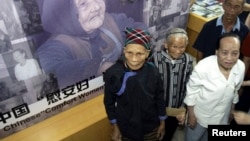During World War II, the Japanese Imperial Army forced women and girls into sexual slavery in China. These "comfort women," as they became known, were victims portrayed as prostitutes in business on the front lines. But the true life of these women and the conditions they lived in were nothing less than horrific.
Peipei Qiu is a professor of Chinese and Japanese at Vassar College. Her research sheds new light on one this traumatic episode. She co-authored the book Chinese Comfort Women: Testimonies from Imperial Japan's Sex Slaves with Su Zhiliang and Chen Lifei, two scholars based in China. She told VOA's Frances Alonzo why this new information is of significant importance today.
QIU: This book is the first book in English to record the experiences of Chinese women who were forced into sexual slavery by Japanese Imperial forces during the Asian Pacific War, which was 1931 to 1945. It gives the historical accounts of 12 comfort station survivors in their own words. And it’s supported by records from archival documents, investigations, reports, local histories, witness testimonies and other findings from the Chinese research. It also offers information of the conditions of the survivors’ lives both before and after the war to help [the] reader understand the social, cultural and political environments that prolonged the suffering of these women.
ALONZO: How is there still sensitivity about what happened at that time?
QIU: After the war, the comfort women’s experience was virtually ignored and survivors were silenced. But from 1990, the Korean and Japanese researchers and feminist scholars started to bring this issue to the world’s attention. Then people started to know that this is one of the least recognized tragedies and war crime. There is a very large number of Chinese victims but their stories remain untold. In the past decades, some Japanese politicians and activists still insist that there’s no evidence showing that this military and the government’s direct involvement in forcing the women into comfort stations. And they’re saying that women who came out to testify, they are actually prostitutes making money at the front lines. They’re also saying that telling the story of the comfort women are to disgrace the honor of Japanese people. That’s why it’s very important to make clear what actually happened to these hundreds of thousand women.
ALONZO: You mentioned some things that surprised you. What was that?
QIU: The scope of military sexual slavery was much larger than previously known.
ALONZO: Let’s talk numbers. How many people are we talking about?
QIU: The estimation from researchers based on available information was that between 30,000 or 200,000 women were forced to be sex slaves during the war. The Chinese researcher’s findings indicate the number is about 400,000 women.
ALONZO: What stories did you come across that you felt needed to be told and shared with others?
QIU: There is a survivor named Liu Mianhuan from the Shanxi province. Liu was the only child of her family. Before turning 16, Liu was abducted right in front of her mother’s eyes. When the Japanese soldiers came to her village, she was gang-raped every day and her entire lower body was soon so mutilated that she was festering with sores. And she said the pain was so excruciating to the point that she was unable to stand or sit. When she needed to go to the latrine, she had to crawl on the ground.
In order to rescue her, Liu’s parents sold a flock of sheep which had been the family’s source of livelihood. They presented money to the occupation army and begged them to release their daughter. Perhaps the Japanese troops concluded that Liu was too sick to continue servicing the soldiers. So they took the money and let her parents take her home. But a few months later, the soldiers returned to her home again to look for her. Liu barely escaped the second abduction by hiding in the cellar.
This comfort woman issue is still causing distrust and tension in Asia and around the world.
ALONZO: Why is that? I mean, it’s been decades since it happened. Why such sensitivity, do you think?
QIU: Because there is no recognition of the war crime. There is deep rooted distrust. So many countries are still seeking sincere apology and they want to see the Japanese government take responsibility to help heal the victims’ wounds in the remaining days of their lives. It is not acceptable to say that the issue belongs to the past. Whatever people say that commemoration victims of atomic bomb or Holocaust is not necessary, is that acceptable? The human sufferings of this kind of magnitude should not and cannot be dismissed. What we choose to recognize and to remember from the past not only affects our present time but also shapes our future then we have hope to achieve peaceful future. That’s where the healing begins.





